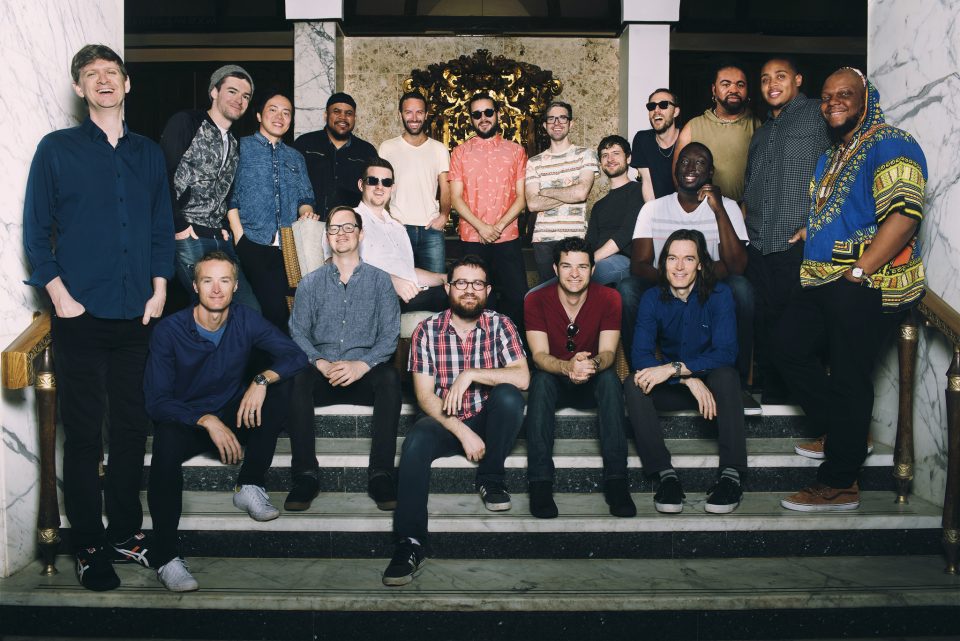Snarky Puppy’s Michael League on the Joyfully Eclectic Group’s Latest Evolution
The prolific producer and bandleader discusses his ensemble’s groove-centric new album, why he’s unfazed by Grammy wins and what’s next

Snarky Puppy leader Michael League explains how the group is mellowing while still innovating on new LP 'Immigrance.' Photo: Stella K
At Snarky Puppy shows, Michael League never knows what kind of music head will be sitting in the front rows. “There are people in Slayer or Biggie Smalls T-shirts,” he says. “Sometimes it’s folkloric musicians. There are people who were around when Weather Report was doing its thing and see some sort of continuum happening. People come up to me all the time and say, ”˜I can really hear the Mahavishnu or Return to Forever influence.’ It’s a very diverse audience.”
That range is surely tied to the music Snarky Puppy has been making for more than 15 years. With League has its founder, bassist and frequent composer, Snarky Puppy have been religiously unclassifiable; on their nearly dozen live or studio records, they’ve incorporated jazz, funk, and elements of world music and fusion. The Grammys they’ve collected ”” Best R&B Performance in 2013, Best Contemporary Instrumental Album in 2015 and 2016, the latter for Culcha Vulcha ”” are themselves an indication of how wide-ranging their sound is.
“People who have been with us after 16 years, the only thing they really want from us is to try new things,” League, 34, says. “That’s what they signed up for. If we had made three pop records after Culcha Vulcha, we would’ve lost all our fans. We have a history of jumping from one bizarre connection to another.”
On their new album, Immigrance, the twist is a subtle maturity. Workouts like “Chonks” and “Bigly Strictness” allow some of the 19 musicians to stretch out with liquid guitar, horn or keyboard solos, yet the band leans into its grooves ”” more in service to melodies than chops. Songs like “Coven” even sport a big-band mellowness (and an old-school Mellotron to boot).
“You risk alienating people who love the big, exciting moments,” League admits. “But as we get older, the guys are into the idea of nice grooves and sounds, especially the farther away they get from being young! Those things appeal to you more than crazy licks. We’re more into setting up nice grooves that we like and sitting with things a bit longer.”
Born in California but raised in Alabama and Virginia, League was a teenage rocker, playing Led Zeppelin and Cream covers with a high school band and reveling in Pearl Jam and Soundgarden. But in a sign of his growing eclecticism, his first CD purchase was Blackstreet’s Another Level (the one with “No Diggity”), and his musical mind was blown by Steely Dan’s Nineties live album Alive in America.
“They were grooving in a rock & roll and funk way, which opened me up to that thing, and I was gone,” he says. “I was playing guitar at the time, so hearing guitar players mix jazz and rock to me was the itch I needed to have scratched. There was something about jazz that felt like a tall, distant mountain that needed to be climbed.” (Not surprisingly, parts of Immigrance sound like late-period Steely Dan without the Donald Fagen vocals.)
At the University of North Texas, League ”” who switched to bass during high school, where he also played in a jazz-fusion group ”” studied jazz, practiced scales and formed the early version of Snarky Puppy in 2003. After dropping out, League remained in Dallas. His musical palette expanded even further when he was invited to sit in with Erykah Badu and her band and also played gospel in clubs with some of her musicians. “I had no idea they were living and playing in Dallas four nights a week in that club,” he says. “It was a big breath of fresh air after doing something I had done in school for so long.”
By his own admission, League ”” who relocated to Brooklyn a decade ago ”” is “a stubborn person,” adding, “That’s why I started an instrumental band with this many people. It’s complete financial suicide.” As heard on Immigrance, he also still loves the album format and the range it offers, despite it being fairly battered these days.
Yet for all his iconoclasm, League and Snarky Puppy have been rewarded, and not just with Grammys. League has a studio in Brooklyn. He’s already planning an ambitious follow-up to Immigrance that will be filmed and recorded around the world. And he continues to tour and record with his other band, Bokanté, which fuses blues and West African music.
At the encouragement of David Crosby, with whom League has collaborated on record and onstage in the last few years, League is also planning his first solo album, featuring his singing and guitar playing. Crosby has also been an inspirational figure. “I’ve learned so much from Crosby about what not to do,” he says. “He’s very forthcoming about the mistakes he’s made in his life: ”˜Please don’t ever do this ”” I did, and I regret it and it haunts me.’ So I learned so much from that.”
And as for those Grammys ”” and the head games they can play on musicians? “Most people think that once you win Grammys you have to start appealing to more people and keeping the audience happy,” League says. “I feel the opposite. Once we started getting attention, it gave us license to do whatever we wanted, knowing people will give it a chance. I’d rather do what I want to do than do what people would like me to do.”







